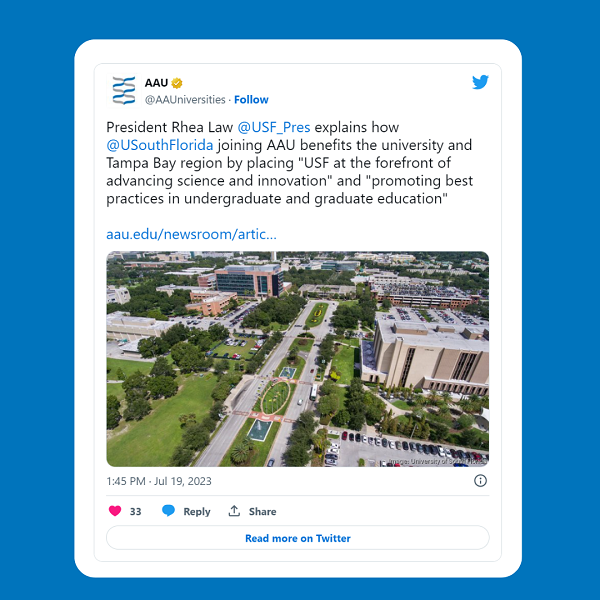 Student Aid Alliance Expresses Concern Over Proposed Cuts to Federal Student Aid Programs
Student Aid Alliance Expresses Concern Over Proposed Cuts to Federal Student Aid Programs
The Student Aid Alliance, which includes AAU, sent a letter to leaders of the House Appropriations Committee expressing “deep concerns with the drastic cuts proposed in the fiscal year (FY) 2024 Labor, Health and Human Services, Education, and Related Agencies funding bill.” The bill proposes to eliminate funding for the Federal Work-Study program and the Federal Supplemental Educational Opportunity Grant program. As the alliance’s letter explained, “Together with the Pell Grant, these two programs provide access to college for millions of low-income students nationwide.”
The proposed FY24 House Labor-HHS-Education bill provides a total of $147 billion in discretionary funding, which is $60.3 billion below FY23 spending levels. The bill also cuts funding for the Department of Education by $12.1 billion to $67.4 billion.
The alliance’s letter thanked the committee for not cutting the Pell Grant maximum, but noted that, if the bill was enacted, “this would be the first year Congress did not provide an increase in this program since 2012.” The House bill freezes the maximum Pell award at $7,395; AAU strongly supports increasing the maximum to $13,000. “Overall, this bill falls woefully short of what is in the best interest of students, and we strongly urge you to increase the funding levels for student aid during the full House Committee on Appropriations markup,” the alliance’s letter said.
 Lawmakers Reintroduce the Senator Paul Simon Study Abroad Program Act
Lawmakers Reintroduce the Senator Paul Simon Study Abroad Program Act
Earlier this month, Sens. Dick Durbin (D-IL) and Roger Wicker (R-MS) reintroduced the Senator Paul Simon Study Abroad Program Act to help expand study abroad opportunities for American students. Reps. Brian Fitzpatrick (R-PA) and Brad Schneider (D-IL) also introduced a companion bill in the House.
The bill specifically seeks to increase the total number of undergraduate students studying abroad. It also seeks to increase the number of underrepresented and minority students in study abroad programs and to increase the number of students studying in nontraditional locations abroad. “Study abroad is a valuable experience for many American college students who hope to become our country’s future leaders,” said Sen. Wicker in a press release. “I appreciate this effort to expand access to study abroad for thousands of undergraduates who would not otherwise have the opportunity.” The full bill text is available here. AAU supports the bill.
 Two AAU Members Join Consortium to Improve Access to Clean Water
Two AAU Members Join Consortium to Improve Access to Clean Water
The University of Arizona, the University of Southern California, and the University of Nevada, Reno have joined together to create a new consortium to improve clean water access, especially in the American Southwest. (The University of Arizona and USC are both AAU members.)
According to USC, the Water Reuse Consortium has been awarded an initial grant of $12.3 million by the U.S. Army Corps of Engineers Research and Development Center’s Construction Engineering Research Laboratory to “focus on research and development initiatives to advance water treatment technologies, enhance the efficiency of water reuse systems and drive sustainable policies and practices while addressing public health concerns.” University of Arizona President Robert C. Robbins said that the university’s expertise “will be key in ensuring potable water for Southwest communities as we face water usage cuts and historic drought.”
News of Interest
Pittsburgh Post-Gazette: Pitt Sees Record Application Numbers for Incoming First-Year Class – The University of Pittsburgh’s Oakland campus received a record 58,200 applications for admission for the 2023-24 academic year. Former Pitt Chancellor Patrick Gallagher attributed the increase to the university’s admissions team, its growing reputation, test-optional policies, and use of the Common App.
Science: Congressional Spending Panels Cruel to NIH, Kinder to NSF – House appropriators are proposing a 5.9% reduction to the current budget of the National Institutes of Health; President Biden had requested Congress to boost the agency’s budget by 2% in FY24. The National Science Foundation has fared better – appropriators in both the House and the Senate have proposed modest increases to the agency’s budget in FY24.
USA Today: Biden Has Another Plan for Mass Student Loan Forgiveness. It Could Be Excruciatingly Long – The Biden administration is taking a new route to student loan forgiveness after the Supreme Court struck down the president’s initial plan. The Department of Education is using a process called “negotiated rulemaking” to “write a regulation that will allow the government to cancel some student debt.” The process could take months, or even years, however, and could also be subject to legal challenges.
Daily Camera: Scientists Across the Country Launch Projects on New NCAR Supercomputer – A new supercomputer, capable of performing “19.87 quadrillion calculations per second” just came online at the National Center for Atmospheric Research in Wyoming. Scientists at the University of Colorado, Boulder will use the supercomputer to “strengthen the understanding of the potential impacts of climate change on Arctic rivers, fish, and Indigenous communities.”
CNN: Department of Education to Host Admissions Diversity Summit After Supreme Court Guts Affirmative Action – Later this month, the Department of Education will host the National Summit on Equal Opportunity in Higher Education to find “new ways to work diversity into the admissions process.” The summit “will bring together college presidents, researchers, K–12 educators and other experts” to discuss “how to move forward after the Supreme Court’s ruling.”
Featured Research

Snap Work Requirements: Did Research Lead to the Homeless Exemption?
A team of economists from the University of Rochester, the Massachusetts Institute of Technology, Harvard University, the University of California, Berkeley, and the University of Maryland recently published a study showing that food stamp work requirements have “a disproportionate, adverse effect on homeless recipients.” The team found that the work requirements had “no effects on employment” and instead “led to a reduction in beneficiaries, chiefly among homeless recipients with limited to no employment history.”

Similar to Humans, Elephants Vary What They Eat for Dinner
Conservation biologists from Brown University analyzed the dietary habits of wild elephants and found that “elephants vary their diets based not only on what’s available but also their preferences and physiological needs.” The scientists found, for example, that a pregnant elephant “may have different cravings and requirements at various times in her pregnancy.” The study shows that elephants need access to a variety of plants to prosper in the wild and could have implications for wildlife conservation.
From Our Feeds

University of South Florida President Rhea Law explains how joining AAU benefits the university and the Tampa Bay region overall. “Joining the AAU places USF at the forefront of advancing science and innovation; promoting best practices in undergraduate and graduate education; and strengthening the contributions of leading research universities to American society,” she wrote.